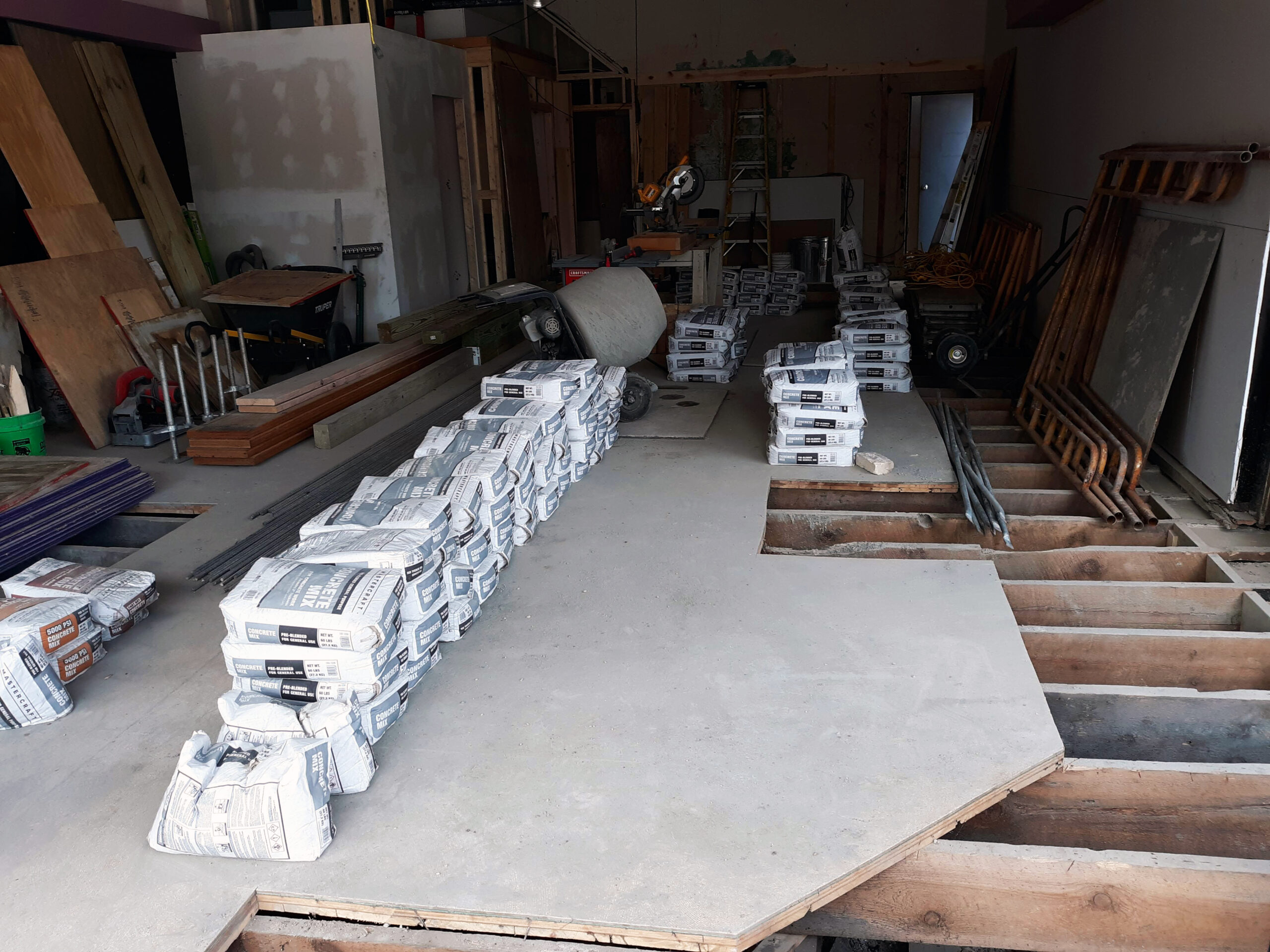
Mitigating Risks in Commercial Construction
Proven Systems, Proven Results
The ground beneath the commercial construction industry is shifting rapidly. Gone are the days of predictable material deliveries and stable pricing. Today, we operate in a ‘dynamic’ landscape, a term that barely scratches the surface of the volatility we face. Global events, from geopolitical tensions and economic downturns to unprecedented weather patterns and pandemics ripple through the supply chain with devastating consequences. Material shortages, once a rare occurrence, are now commonplace, forcing project managers to scramble for alternatives and endure costly delays.
Even the most meticulously planned commercial projects, those with detailed schedules and seemingly ironclad contracts, are vulnerable to unexpected disruptions. These aren’t just minor inconveniences; they can derail entire projects, leading to significant financial losses, missed deadlines, and damaged reputations. At DBCC, we’ve witnessed these challenges firsthand. We understand that proactive risk mitigation isn’t just a best practice—it’s a necessity. That’s why we’ve developed a comprehensive guide, designed to equip you with the knowledge and strategies needed to navigate these turbulent waters and safeguard your investment. This isn’t just about surviving; it’s about thriving in the face of uncertainty!
Table of Contents
Understanding the Risks You Face
Practical Strategies for Success
(Click to scroll down)

Understanding the Risks You Face
The modern construction supply chain is not a simple path, but a sprawling, interconnected web of global and local players, where manufacturers, distributors, transportation companies, and specialized subcontractors rely on each other, creating an intricate ecosystem vulnerable to disruptions. These disruptions can arise from various sources, many of which may come as a surprise to business owners.
Material Shortages
Material shortages in the construction sector are a multifaceted problem, driven by a complex interplay of global and local factors. Fluctuations in demand, production bottlenecks, geopolitical tensions and natural disasters can quickly lead to scarcity of essential materials. Factors such as labor shortages, rising fuel costs, and unpredictable weather patterns further contribute to their scarcity. This confluence of events has resulted in widespread shortages of key materials including lumber, steel, concrete, and electrical components, posing significant challenges to project timelines and budgets.
Price Volatility
Price volatility in the construction industry refers to the unpredictable and often rapid fluctuations in the costs of building materials. This instability poses significant challenges for project budgeting, planning, and overall financial management. Supply and demand, global economic conditions and market speculation are just a few of the contributing factors to price volatility. Small shifts in our economy can cause disastrous changes in the prices of our resources.
Logistics Challenges
Transportation delays, port congestion, and rising fuel costs can impede the timely delivery of materials. When a project is put behind time, the entire construction may suffer. Hours and productivity lost to delays can cause a significant decrease in profitability and efficiency.
Supplier Reliability
A supplier’s financial collapse can abruptly halt the delivery of crucial components, forcing you to scramble for alternatives and potentially delaying progress. Similarly, sudden production shutdowns, whether due to equipment failure, labor disputes, or raw material scarcity, can create a ripple effect, impacting downstream schedules. Furthermore, quality control issues, such as defective materials or inconsistent manufacturing, can necessitate costly rework and replacements, leading to both time and financial setbacks for you and your company.
Geopolitical Factors
Geopolitical factors can have a profound and multifaceted impact on the commercial construction industry. These influences can disrupt supply chains, alter material costs, and create overall economic uncertainty. Tariffs, trade embargos, and international conflicts can drastically affect the availability and cost of building materials.
Practical Strategies for Success
To minimize and mitigate the impact of supply chain disruptions, contractors must employ a range of proactive strategies, transforming their operational approach from reactive to anticipatory. This necessitates a comprehensive overhaul of traditional practices, moving beyond mere risk assessment to a dynamic, forward-thinking methodology. It involves establishing a robust network of diversified suppliers, not just as a backup, but as a core component of their procurement strategy.
Diversification of Suppliers
We don’t put all our eggs in one basket. Establishing relationships with multiple reliable suppliers ensures a steady flow of materials, even during disruptions. If one supplier faces an unforeseen interruption, having an immediate and equipped alternate supplier is crucial to the continuity of the project, preventing costly delays and maintaining project momentum. This diversification not only safeguards against single-point failures but also fosters competitive pricing and access to a wider range of materials and expertise, ultimately strengthening our resilience against the unpredictable nature of the modern supply chain.
Early Procurement
We prioritize early procurement, especially for materials with long lead times, recognizing that proactive ordering is essential in today’s volatile market. This strategy allows us to secure crucial resources well in advance, mitigating the risk of being caught off guard by sudden shortages or price surges. By anticipating potential bottlenecks, we effectively lock in favorable prices and ensure a consistent flow of materials to the job site. This proactive approach not only minimizes the impact of supply chain disruptions but also provides valuable lead time for quality checks and logistical planning, ultimately contributing to a smoother and more efficient construction process.
Strategic Inventory Management
Maintaining adequate inventory levels of critical materials acts as a buffer against unexpected delays. In a volatile market, this strategic reserve cushions against supply disruptions, preventing project timelines from derailing. Strategic inventory management also allows for price stability and flexibility, ensuring timely responses to unforeseen issues and bolstering overall project resilience.
Robust Contractual Agreements
Our contracts proactively address supply chain disruptions with clauses like price escalation and material substitution protocols. Price escalation allows for cost adjustments due to market fluctuations, while material substitution protocols outline pre-approved alternative materials and processes in case of shortages or delays. These clauses protect against unforeseen delays and cost overruns, ensuring project stability.
Leveraging Technology and Data Analytics
We use advanced technology to track material availability, monitor supplier performance, and forecast disruptions. Our systems use data analytics to predict shortages and price changes, track shipments in real-time, and assess supplier reliability. This allows us to make informed decisions, minimize delays, and optimize material flow.
Building Strong Supplier Relationships
We foster open communication and collaboration with our suppliers, enabling us to identify and address potential problems early on. Vulnerabilities within the supply chain underscore the importance of thorough supplier vetting and robust contingency planning to mitigate the risks associated with unforeseen disruptions. This proactive partnership ensures that we can navigate market fluctuations and unexpected challenges with agility and confidence, maintaining project momentum and minimizing client impact.
Developing Contingency Plans
We develop detailed contingency plans for disruptions, including vetted alternative suppliers, pre-approved substitute materials, and adaptable construction methods. These plans ensure rapid responses to unforeseen events, minimizing delays and maintaining project continuity.
Maintaining Enhanced Communication
Constant communication with all stakeholders, from clients to subcontractors, is paramount. It builds trust, ensures alignment, and allows for proactive problem-solving. Clear channels and regular updates keep everyone informed, minimizing misunderstandings and delays, ultimately contributing to project success.

Tips for Our Clients
We believe in empowering our clients with the knowledge they need to navigate the construction process. This commitment translates to transparent communication, educational resources, and proactive guidance throughout every stage of their project. We aim to demystify complex procedures and provide the tools for informed decision-making, ensuring our clients feel confident and in control.
Conduct Through Due Diligence
Carefully vet potential contractors and suppliers. Evaluate their supply chain management systems thoroughly. Look for evidence of diversification, contingency planning, and transparent communication. This ensures they can navigate disruptions and protect your project.
Establish Realistic Project Schedules
Collaborate closely with your contractor on scheduling. Ensure the schedule reflects potential delays due to material shortages or logistical challenges and build in buffer time for unexpected disruptions. This proactive approach helps manage expectations and maintain project momentum.
Build Budget Flexibility
Prepare for budget flexibility as construction costs can fluctuate significantly during a project. Incorporate a contingency fund to address potential price increases and unforeseen expenses. This allows for adjustments without compromising the project’s scope or quality.
Embrace a Collaborative Approach
Cultivate a collaborative environment, as open communication is key. Encourage your contractors and suppliers to share potential issues early. This allows for joint problem-solving and the proactive mitigation of potential challenges.
Overall, navigating the complexities of the construction supply chain requires a proactive and strategic approach. By understanding the risks and implementing effective mitigation strategies, we can ensure project success, even in the face of unforeseen challenges. At Design Build Commercial Construction, we’re committed to providing our clients with the expertise and resources they need to navigate these challenges and achieve their construction goals.
Want To Know More?
Transforming spaces is what we do! Whether it’s through construction, renovation or repurposing, our skilled team at DBCC has the knowledge to help you today. For more information about what we do and how we transform commercial businesses, read about how we do Property Repurposing and Property Renovation or send an email on our Contact page! Have any other questions? Some of our most frequently asked questions are answered in our FAQ. We look forward to working with you and your business and can’t wait to hear from you!

Author: Chad Peda
Date: April 1, 2025
Address
International Market Square
275 Market Street, Suite 197
Minneapolis, MN 55405
Phone
(763) 393-6405
STAY CONNECTED
We share a unique project / case study quarterly, and other interesting things from time to time. We promise you no worthless spam. 🙂
Committed to our Clients
“While working with Chad at DBCC our office renovation was smooth and seamless. Before I knew it, we were up and running, while I stayed focused on our needs without worry or concern. I highly recommend their services.”
-David Knudson, CEO
Home Inspectors of America

a Design Pro Brands company – MN Cont. Reg#: IR 809252